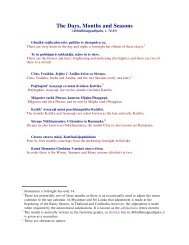Mahaparinibbanasuttam (DN 16) - Ancient Buddhist Texts
Mahaparinibbanasuttam (DN 16) - Ancient Buddhist Texts
Mahaparinibbanasuttam (DN 16) - Ancient Buddhist Texts
Create successful ePaper yourself
Turn your PDF publications into a flip-book with our unique Google optimized e-Paper software.
The Second Chapter for Recitation - 73<br />
uccārapassāvakamme sampajānakārī hoti,<br />
in passing stool and urine, he is one who practises with full awareness,<br />
gate ṭhite nisinne, sutte jāgarite, bhāsite tuṇhībhāve sampajānakārī hoti.<br />
in going, in standing, in sitting, in sleeping, in waking, in talking, and in maintaining<br />
silence, he is one who practises with full awareness.<br />
Evaṁ kho bhikkhave bhikkhu sampajāno hoti.<br />
Thus, monks, a monk has full awareness.<br />
Sato bhikkhave bhikkhu vihareyya sampajāno ayaṁ vo amhākaṁ anusāsanī.” ti<br />
Mindfully and with full awareness, monks, a monk should live, this is our advice to<br />
you.”<br />
* * *<br />
Assosi kho Ambapālī gaṇikā: “Bhagavā kira Vesāliṁ anuppatto<br />
The courtesan Ambapālī heard: “The Gracious One, it seems, has reached Vesālī<br />
Vesāliyaṁ viharati mayhaṁ Ambavane.” ti<br />
and is living near Vesālī in my Mango Wood.” 103<br />
Atha kho Ambapālī gaṇikā bhaddāni bhaddāni yānāni yojāpetvā,<br />
Then the courtesan Ambapālī, after having (many) great and august vehicles prepared,<br />
bhaddaṁ bhaddaṁ yānaṁ abhiruhitvā,<br />
and mounting (those) great and august vehicles,<br />
bhaddehi bhaddehi yānehi Vesāliyā niyyāsi,<br />
departed with those great and august vehicles from Vesālī,<br />
yena sako ārāmo tena pāyāsi yāvatikā yānassa bhūmi yānena gantvā,<br />
and after approaching by vehicle to her pleasure garden as far as the ground for vehicles<br />
(would allow),<br />
yānā paccorohitvā, pattikā va yena Bhagavā tenupasaṅkami,<br />
and descending from the vehicles, she approached the Gracious One by foot,<br />
upasaṅkamitvā Bhagavantaṁ abhivādetvā, ekam-antaṁ nisīdi.<br />
and after approaching and worshipping the Gracious One, she sat down on one side.<br />
103 Ambapālī’s name means ‘(daughter of the) Mango Keeper’, though according to the<br />
Commentary she was born spontaneously in a mango wood (perhaps this one?), and hence<br />
acquired the name. Courtesans like Ambapāli were often very rich as we can see from the<br />
description of her vehicles and pleasure garden.

















